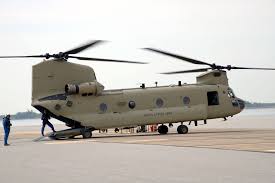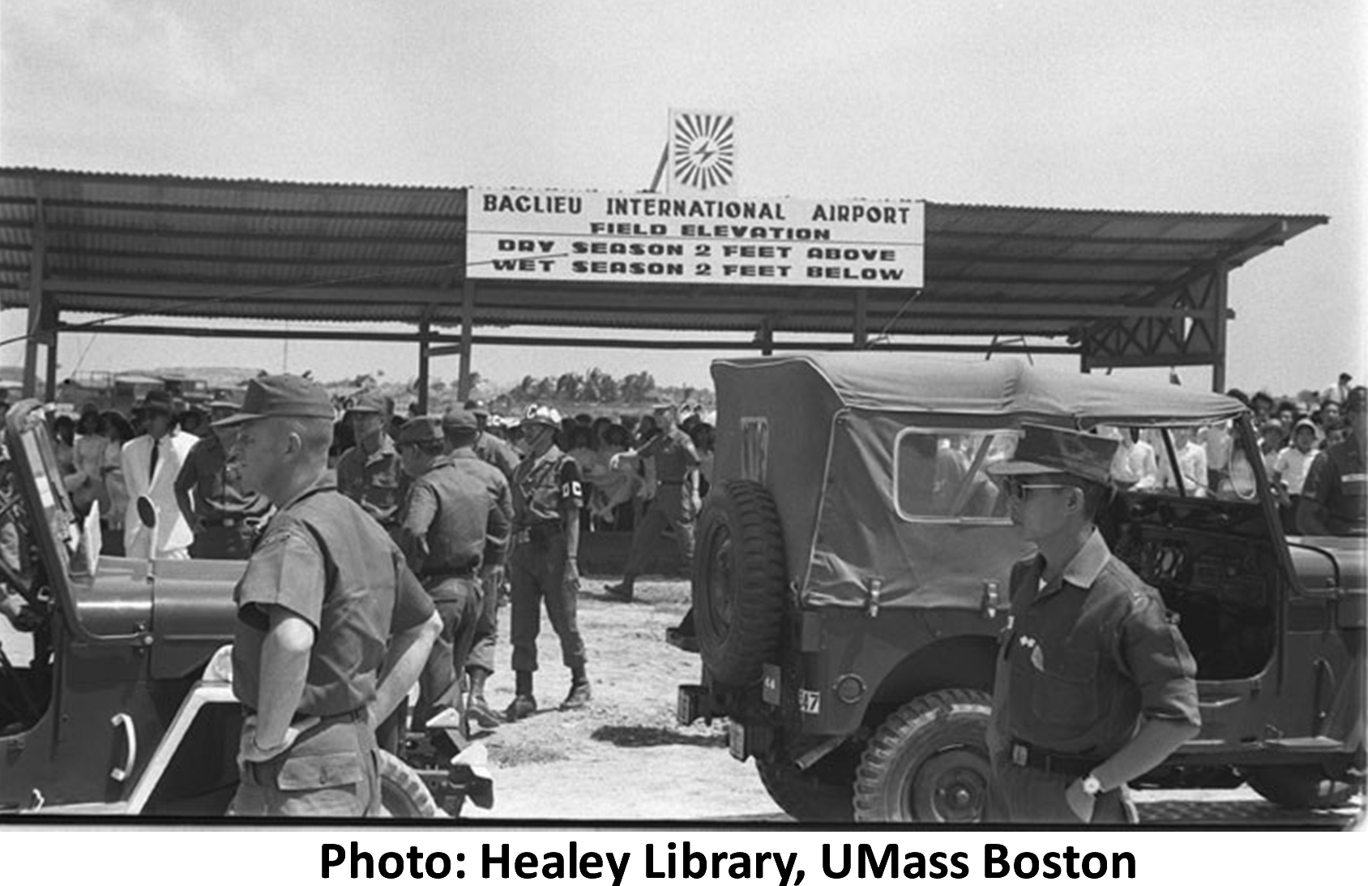
I had just returned to my main advisory team from a temporary assignment to a battalion advisory team having replaced a radio operator who had completed his tour and no immediate replacement was available. I was supposed to return as sergeant of the guard, but a newly arrived advisor had already been temporarily assigned to my slot. I learned about an available position at our Advisory Team's Air Traffic Control Tower at Bac Lieu International.1 Not wanting to risk deployment to yet another field location again, I applied for the airfield position and was quickly accepted.
My job was to climb our team's small wooden air traffic control tower whenever an aircraft called in and provide them wind direction and wind velocity then stay in contact with him until such time as he landed. I would then descend the tower and guide him to a park area. It was an international operation with American, Australian, and Vietnamese flights landing with foodstuffs, supplies, fuel and ammunition for our Advisory Team and supported units.
Bac Lieu had a small dirt runway barely long and wide enough to accommodate C-123 aircraft. On occasion, we would accept a C-130 Hercules if he were carrying a light load. There were water-filled rice patties on both sides of the runway. Fuel and oil were delivered in 55-gallon drums from a C-130 Hercules that could not land due to its massive size and weight. We would stretch a cable tied to stakes about 15 inches off the ground from one side of the runway to the other. The C-130 would come in low with a trailing hook tied to an aluminized pallet of drums with its wheels almost touching the ground. When the hook caught the stretched cable, the C-130 would pull up allowing the pallet of oil or fuel drums to be pulled off the C-130 and onto the dirt runway. We would then stop air traffic and rush over with our forklift to retrieve the pallets of oil and fuel off the runway and to a staging area.
More than once, the delivery did not go as planned when the hook failed to catch yet the C-130 still pulled straight up. Palleted drums of fuel and oil would then drop several feet off the ground and either break open or roll around all over the dirt airstrip or into the rice paddies. I'm sure many a rice crop was ruined by spilled fuel and oil.
A major part of my duties was working with crew chiefs of incoming aircraft to determine how much cargo or passengers they would accept. I had a waiting room with makeshift wooden benches that held some twenty waiting passengers comfortably, yet it was normally filled well beyond capacity nearly every day of the week. Americans were first priority for travel then Vietnamese military. Vietnamese civilians and (more likely than not) a Viet Cong or two in the mix were the last priority. These people would come in the morning, bring their lunch and dinner with them and just sit in the crowded unventilated waiting room hoping for a flight to their destination. Many of them would be there all day without getting their flight to their destination. They would again report back in that next morning hoping to get their flight. They opted for air travel since many roads in the Mekong Delta were perilous, filled with land mines and controlled by the enemy.
I was enjoying my job which I shared with another sergeant. Life was good until a C-123 aircraft approached our airspace. The pilot made radio contact when he was still a distance from the airfield. I climbed the tower and started searching the airspace until I spotted him. As was normal procedure, I pressed the reload switch on the anemometer, read the wind direction and wind velocity and called them out to the pilot, a US Air Force lieutenant colonel. Only minutes later he was over the airfield landing with his wings tipping from side to side. I thought that was strange since I had not witnessed that previously.
I descended the tower, made visual contact with the pilot and directed him to an available park area close to the tower. As soon as he landed and cut the engines off, he started walking towards me seemingly incensed. I greeted him, saluted him. Returning my salute, he half-yelled, “You gave me the wrong goddamn wind direction! I almost crashed because of you!” He added, "The goddamn wind direction you gave me was almost 180 degrees off!"
“Actually, colonel, there is no way to misread the wind direction. You got the right direction. Maybe you misunderstood me, but I did call out the readings to you twice.” That should have been the end of it, but I was perturbed at the charge. I told him “In fact, let me go back up the tower and verify the direction I gave you.”
I climbed the tower and verified the wind direction as I had presented it to him. I then made a rookie mistake. Just to ensure the anemometer was working properly, I hit the reload switch again. My heart sank as the wind direction turned almost 180 degrees as the colonel had charged. I climbed back down and reported to the colonel, “You would not believe it, colonel. The wind direction changed almost 180 degrees from the direction I gave you. But it was correct when I called out the wind direction.” He stuck his stubby cigar in his mouth, shook his head and walked back to his aircraft where his crew was starting to unload supplies for the team.
Later that day I was in the mess hall when the admin officer stopped by my table and told me to go see him after dinner. By this time in my tour, I had gotten to know the admin officer quite well. I considered him my nemesis though he was always fair with me. I just knew the topic of conversation would involve the air force lieutenant colonel’s incident. I stopped by his office on my way to my hooch. He informed me some lieutenant colonel had come to him ranting and raving that he had almost crashed because I had given him the wrong wind direction. I explained to the captain that either the anemometer needed calibration or the wind just shifted from the time I gave him the wind direction. He wanted more detailed information in case it developed into an air incident report. I informed him that I was leaving the Army in just a couple more months and an air incident report was the last thing on my mind.
“If it comes down, you’ll have an easy job, captain,” I replied. “Just blame it all on my error, and indicate I was removed from my airfield job.” No air incident report was received at least during the remainder of my time there.
That incident pretty much cooled me on the airfield tower. I began looking for another job. A couple of days later, the admin officer told me there was a position available at the team’s PX. “The PX lieutenant needs someone there. I recommended you for it," he said. "Now this young lieutenant is new to the army, so he's going to need some guidance. I expect you to bring him around and provide that guidance."
Thinking I would get fired from my air operations job, I had already talked to the PX lieutenant and applied for the PX position. Still, I felt I’d been fired from my air operations job.
“Screw up and move up” is an old army saying and probably as old as the army itself. Though I had not technically “screwed up”, the admin officer attributed the air incident to my not providing correct wind direction readings. But the “screw up” resulted in me getting one of the best jobs of my military career. With no formal training, I was thrust into a position where I quickly learned and nearly mastered the job of PX and warehouse manager. I was now working for a brand new second lieutenant fresh out of the Alabama A&M University ROTC2 program. He was savvy but not brilliant and had several physical issues that made me wonder just how he got accepted into the ROTC program. He was probably no more than 5 feet tall, was humongously bow-legged and wore Coke bottle lenses to correct his extreme nearsightedness. "I'm new to this, sergeant," he told me, " but if we work together, we'll make this work. You just tell me what to do. I'll sign the forms you need so you can go to Tan Son Nhut and get merchandise for the PX."
I found a manual typewriter in a warehouse that escaped burning during Tet '683 when our main warehouse and several other buildings were burned to the ground. I began filling out requisitions for merchandise and liquor. The new lieutenant obediently signed every requisition I presented him. I was authorized two C-123 cargo planes from Tan Son Nhut to Bac Lieu weekly and completely filled our remaining warehouse. With his signature I acquired another unused building which I used to store liquor, beer and soda. I bought and sold thousands in beer and liquor sales weekly. I made mistakes, but I was able to cleverly hide my mistakes from the PX lieutenant. I wanted one case of potato chips expecting fifty bags and mistakenly ordered one pallet of chips containing some five-hundred bags. I contacted the Soc Trang and Can Tho PXs who each agreed to take all the potato chips I could spare. I had my Vietnamese warehouse workers fill a truck with boxes of potato chips and drive it to our airfield. I found a Chinook CH-47 about to take off from the Bac Lieu airfield. The Chinook crew chief contacted the pilots and agreed to take the truckload of chips to the Soc Trang airfield where the PX would pick them up. We pulled the truck up to the Chinook and started loading the chips into the Chinook. We were nearly done when the crew chief informed me they had to abort the flight due to a higher priority mission to pick up body bags in a field location. We pulled the truck up to the Chinook once more and began off-loading the chips back into the truck. The crew chief asked if they could get some chips. I gave them a box of chips for their trouble.

CH-47 Chinook Helicopter
We parked the truck there in the airfield, and I approached every flight landing at Bac Lieu asking them to deliver as many boxes of chips as they could to either Soc Trang or Can Tho. We did the same that next day, and I was able to reduce my inventory to a manageable level.
Except for those pesky mortar and rocket attacks, life was finally good for me and continued to be so until I separated from service in September 1968. On the day that I left Advisory Team 51 to return back home to Texas, there was an audit team from the PX warehouse on Plantation Road, Tan Son Nhut, coordinating with the lieutenant a plan to more than double the size of our Advisory Team 51 PX. It was justified based on the amount of merchandise we moved. The lieutenant was a happy man.

Bac Lieu International during Sec of Defense Robert McNamara's visit.
1 Bac Lieu International - 2 feet above sea level during dry season and 2 feet below during monsoon season.
2 Reserve Officer Training Corps.
3 VC troops throughout the South, from Hue to the Mekong Delta, attacked in force for the first time in the war. Vietnam (ARVN) and American troops killed close to 37,000 of the ill-supported enemy in less than a month. - (https://en.wikipedia.org/wiki/1968_in_the_Vietnam_War)
©Copyright texan@atudemi.com - January 2022